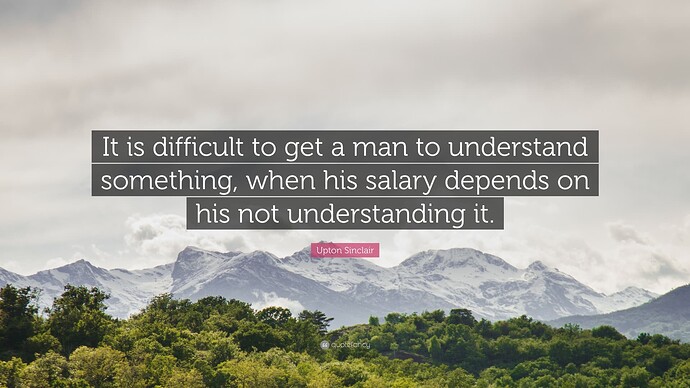This is my backup recommendation
I sort of agree…though I think it’s actually based some on perception as well as reality.
We have an analogous example here in San Diego County. A few decades ago, the county water authority made a bunch of plans for water supply (building desalination plants, securing CO river water rights, etc) based on drought and usage projections.
Then during the drought, when the government asked people to conserve, the residents of SD County actually did! We are one of the best counties in CA for water conservation efforts.
Trouble is, now those investments from decades ago are coming home to roost and because folks are using less water, the county and its various member water districts are forced to raise rates to make up for the lower demand to pay for the projects they agreed to during the bad times.
People HATE this (as expected) and it’s made a thorny issue even worse because high rates mean people use even LESS water…see where I’m going with this? I’m not sure if that’s an indicator that “the economy is bad,” though. It makes people think the economy is bad, for sure, but is it actually bad?
San Diego is one of the few places in California that actually is pulling water from out of state and drying up the Colorado River and causing the aquifers in the Southwest to be depleted of water than has accumulated for thousands of years. Using less water is good, maybe unless you don’t care about the future at all.
The optimal solution is some combination of regulation and taxation that makes fracking environmentally equivalent to other domestic production. Raising the price of fuel by banning more economical (externalities included) extraction methods is a very ham-fisted way to achieve reduced emissions. It’s like bombing a coca field to reduce cocaine consumption by whatever amount the resulting tiny increase in the price of cocaine would cause.
Then if you want to reduce emissions by increasing the price of fuel, it’s much better to do it in a way that our government can capture the revenue with a carbon tax. Increasing prices by banning more efficient production processes will give that revenue to the other oil producers. The @boredsocial plan sounds good to me.
I know it’s good. We all know it’s good. Even the people in san diego all know it is good. You can argue with me if you want but the fact is, San Diego residents did more than most other counties in the state to reduce their water usage and they are paying for it now.
Did you read the first part of my post? The CO river agreements are all part of the old system they set up during the bad times, and they made deals and contracts that they have to pay for, despite us using less water. So they raise rates so they can “honor” those bad deals. Also, it’s actually Imperial county, since the “law of the river” says that Imperial county gets first rights, so they buy the CO river water super cheap, then sell it to SD and the Metro water authority with a huge markup.
It’s not just the CO river stuff. They made a bad contract for their desalination plant, too, and refuse to admit that it’s too expensive, so they raise rates to pay for that, too.
I am deeply immersed in this stuff since I’m working for two water board campaigns, and I and my candidates have to know what’s going on. Fortunately, we have this on the way, which will help east county make 30% of our water and stabilize rates:
https://www.eastcountyawp.com/
I think it would be hard to have a social good/shared resource/communal product or whatever that makes more sense than something like the first few hundred gallons of water per person per month or something like that is free. Imo it’s just absolutely unethical for water to just fall from the sky and then people or governments to just own it and sell it while someone without money might not be able to get what should be their share as just a resident of the planet.
Taxing carbon emissions probably does make the most sense as a way to deal with it, but we’re not dictators and don’t get what we want. So, as little impact as our wishes and votes have, I would apply to other things that help. And taxes are easier to change from administration to administration than the effects of bans. Changes to infrastructure are more important than changes to rules (which can affect infrastructure investment for sure). Fracking equipment suppliers and developers going out of business would have a lasting impact that just slowing down a little during a Harris administration only to ramp up again when Trump Jr. wins in 2028 wouldn’t have.
And this is both the morally and strategically correct way to advocate for something like UBI. Water falls from the sky. Sun shines on everyone. Fossil fuels are were buried long before any humans even existed. If anyone ever has a right to use these things, then everyone does. If the rules we live by are that some people get to monopolize those things because they own land or businesses or control the government and we allow that because it works for society in general, then society should make sure that everyone gets a share of the benefit of the natural resources that they are entitled to and have had taken from them. It’s not charity.
In your world, who builds and maintains the pipes?
What I’m suggesting is that the same people do it - the gubmint, or perhaps a quasi-gubmit-private-industry partnership like many “public” utilities are, but that the first few hundred gallons of water per month for everyone are free. Really, that was pretty obvious, which makes it seem like you’re just being a dick.
eta: Actually, it’s always pipeline workers who build and maintain pipes, not governments or corporations.
Yeah. I suppose assault weapons are allowed because the benefits outweigh the harm, too?
When you’ve lost the former host of the man show
Trump probably has the other 75% of them.
Stanhope probably rfk jr fan
whoa dude, what?
It wasn’t obvious to me, and once again, someone on this board is reading motives into my posts that aren’t there.
This is not me being a dick, it is me trying to specify. Sorry if my autistic ass gets this wrong. I’m begging you not to read any tone or motive into my words except what is on the screen, taken at 100% face value.
Who pays the pipeline workers that build and maintain the pipes after the first free hundred gallons or so? If it’s the government, then how do they get the money to pay those pipeline workers? Asking a legitimate question about how infrastructure would actually function is not me being a dick, I promise I genuinely want to understand your ideas for this and how it’s different from the current model.
Well, instead of explaining how the government can provide funding, I’ll give you some coaching in not sounding like a dick.
“In your world” is what makes that post dickish. If you can’t understand how, maybe you just shouldn’t use that expression at all.
Coming back to the relative pollution of different countries.
This article is a few years old, but highlights some of the things i’ve been talking about. I just read the article and didn’t go to the paper, but shows that Canada has one of the highest greenhouse impact per unit of oil, and Saudi Arabia one of the lowest.
The regulatory regime is clearly a factor, but there are lots of others
Fracking also is particularly high, especially due to methane omissions.
This article suggests that North American fracking has played a huge role in the increase in methane in the last decade or so.
Again. Restating my assertion that globally it’s better to get oil out of easy wells than via fracking.

